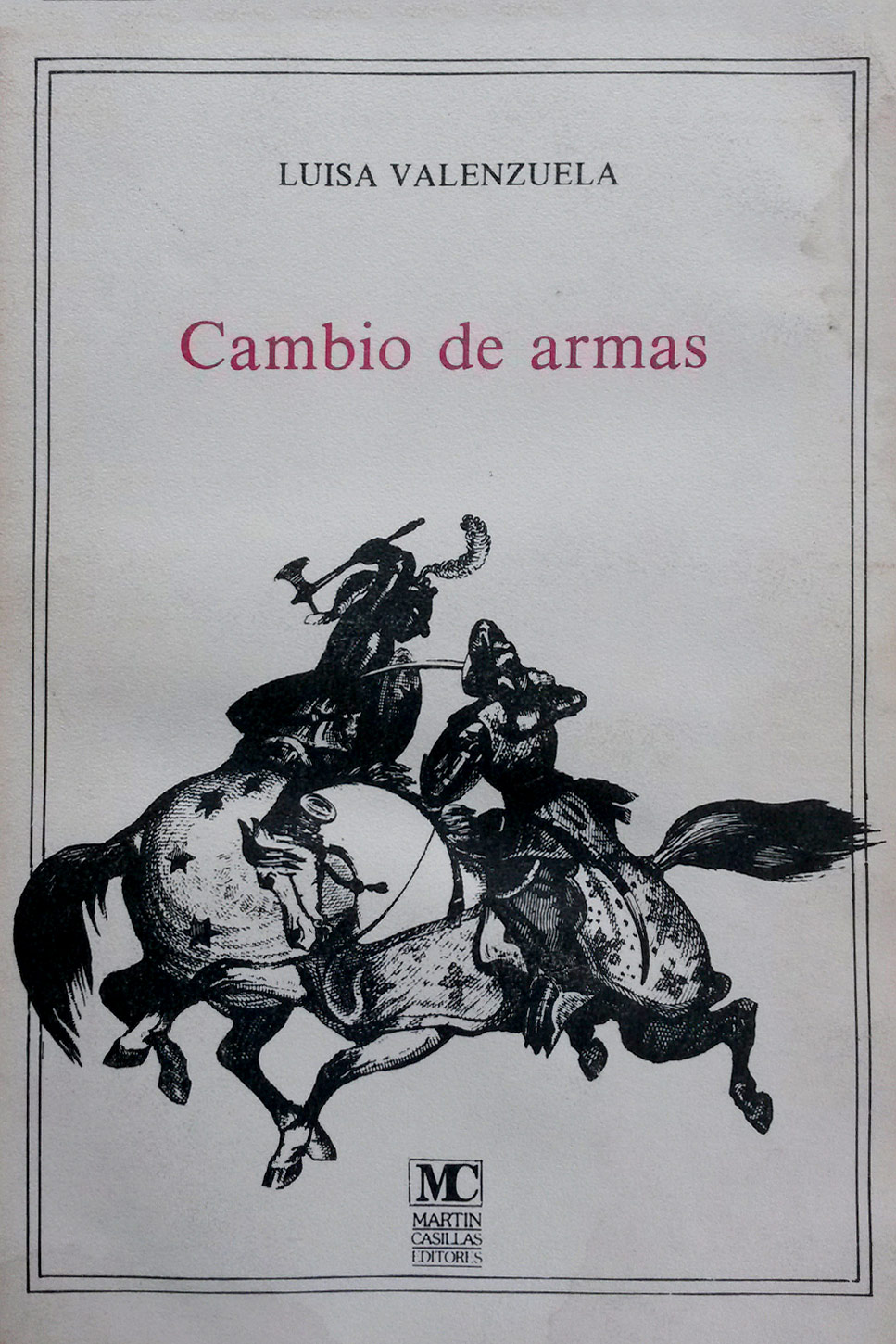Cambio De Armas Luisa Valenzuela Pdf
/ Comments off
Cambio de armas has 107 ratings and 6 reviews. Sentimental Surrealist said: You wanna talk about tragedies, let's talk about tragedies: the burial of Lui.
Goodreads helps you keep track of books you want to read.
Start by marking “Cambio de armas” as Want to Read:
Rate this book
1 of 5 stars2 of 5 stars3 of 5 stars4 of 5 stars5 of 5 stars
Open PreviewSee a Problem?
We’d love your help. Let us know what’s wrong with this preview of Cambio de armas by Luisa Valenzuela.
Not the book you’re looking for?Preview — Cambio de armas by Luisa Valenzuela
Or buy for

Published July 28th 2004 by Grupo Editorial Norma (first published October 1982)
More Details..Cambio de armas
9875451797 (ISBN13: 9789875451797)
Luisa Valenzuela The Censors
Spanish
All EditionsAdd a New EditionCombine
..Less Detailedit detailsTo see what your friends thought of this book,please sign up.
To ask other readers questions aboutCambio de armas,please sign up.
Be the first to ask a question about Cambio de armas Bq maxwell lite.
This book is not yet featured on Listopia.Add this book to your favorite list »
Rating details
Feb 06, 2015Sentimental Surrealist rated it really liked it
You wanna talk about tragedies, let's talk about tragedies: the burial of Luisa Valenzuela in the United States. From what I understand, she's a legend of Latin American literature, counting Carlos Fuentes, Julio Cortazar, and Jorge Luis Borges, the latter also a supporter and friend of the great Silvina Ocampo, whose readers I'd say are super-guilty of tokenizing Latin American writers as magical realists. Granted, the recent popularity of Roberto Bolano, Lina Meruane (note to American publishe..more
Mar 19, 2013Leyre rated it it was amazing
Completely life-changing, it has become one of my favourite books ever. I don't think I have words to describe the way in which Valenzuela writes so disturbingly yet beautifully about the power dynamics between men and women, woman sexuality, political repression and the use of language as a weapon. Just go and read it.
Sex and power are usually a cold brew, no matter how many French herbs you stir in; writing with desire can lead anywhere at all, but writing about desire is a bad-faith invitation to get hot and bothered over a lab report. So what makes this book different—why is Luisa Valenzuela so obviously the real thing? The claustrophobia of state repression rendered as in an exacting horror movie, by what it leaves out, avenues closed. That desire still exists, a familiar beating heart, and has only these..more
Cruel però necessària.
This book of short stories interestingly intertwines the violence of gender, language and politics. Published close to the dissolution of the dictatorship in Argentina, Valenzuela explores the inability of language to explain the randomized violence of the military regime. In 'Cuarta versión', a female narrator tries to piece together and make sense of the fragmented diary of an Argentine actress, Bella, who inadvertently becomes a conduit for political refugees. The narrator desires to understa..more
I just re-read this book (April 2011) in order to teach it for a class on literature of the Southern Cone. This is at least the third time I've read 'Cambio de armas,' and each time I am more impressed by the quality of Valenzuela's writing and more moved by the power of her stories.
Lorena Martínez Lombard rated it it was amazing
Nov 12, 2016
Nov 12, 2016
Zoë Magniette rated it really liked it
Oct 26, 2017
Oct 26, 2017
Casandra Gómez rated it really liked it
Jan 03, 2017
Jan 03, 2017
Evita Galindo-Doucette rated it really liked it
Aug 06, 2012
Aug 06, 2012
There are no discussion topics on this book yet.Be the first to start one »
Recommend ItStatsRecent Status Updates
See top shelves…
38followers
Luisa Valenzuela is a post-'Boom' novelist and short story writer. Her writing is characterized by an experimental, avant-garde style which questions hierarchical social structures from a feminist perspective. She is best known for her work written in response to the dictatorship of the 1970s in Argentina. Works such as Como en la guerra (1977), Cambio de armas (1982) and Cola de lagartija (1983)..more